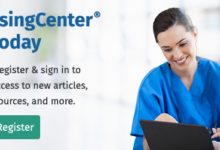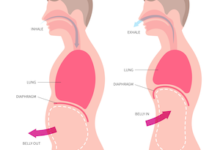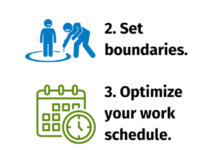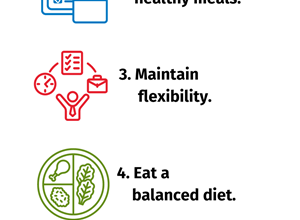Nurses as Influencers: Extending Professionalism to the Social Media World
Almost half of the world’s population uses social media in one form or another, which has led to an increase in those who produce personal content providing one’s own point of view (Vukušić Rukavina et al., 2021). Nurses are becoming more active in the social media world as influencers; some are looked at as trusted professionals who can provide antidotes to medical misinformation, whereas others are seen as purely entertaining. Truthfully, nurses can be both informative and entertaining, however, we must remember that nurses are one of the most trusted professions in the world and we need to remain professional in this relatively new role.
The Benefits of Nurses as Social Media Influencers
There are many benefits to having an audience of social media followers, but there some cautions as well. Our professionalism can be demonstrated by integrity, education, and dissemination of knowledge as well as correction of misinformation. Influencers can be viewed as a source of accurate information for the public and other nurses. Social media can bridge some gaps, evade some conventional barriers that are present in healthcare information and reach colleagues that may not have the strongest network (Gentry& Prince-Paul, 2020; Bautista, Zhang & Gwizdka, 2021).
The role of nurses as social influencers can also combat medical disinformation with evidence-based education that can be targeted to other nurses or the public. Social media moves information at a fast pace, with images and data becoming viral in hours. This can work to our advantage as nurses, but also has disadvantages (Bautista, Zhang & Gwizdka, 2021).
The Cautions of Nurses as Social Media Influencers
The high visibility associated with social media also means that nurse influencers must understand that their audience is likely not limited to healthcare providers, but also lay persons who may misunderstand things like satire – which can be a form of misinformation. Other unprofessional behaviors, such as bullying and blurring professional boundaries in presentation can detract from the positive benefits of nurses as influencers. These behaviors can result in loss of credibility and even legal/disciplinary consequences. Also, there is a certain ethical (and legal) responsibility to ensure one is providing accurate medical information to the public.
One example of this is a complaint filed in October 2022 regarding a California nurse practitioner with a Doctor of Nursing Practice degree (DNP) who referred to herself as “Dr. Sarah” on social media but was not always clear that she was an advanced practice registered nurse and not a physician. She has been fined $19,750 for the ambiguity and violation of the California State Business and Professions Code (Book, 2022).
Follow Your Institution’s Social Media Policy
Many health systems have strict social media policies to protect their interests and the privacy of patients. Some common restriction examples include excluding the name of the facility where the nurse works, obscuring/removing ID badges with familiar trademarks, prohibiting pictures within facilities, and identifying the nurses’ employers within profiles. Obviously, discussion of confidential incidents or protected health information consistent with Health Insurance Portability and Accountability Act (HIPAA) would likely be met with civil as well as legal consequences. Protected health information (PHI) is any information that is specific enough to a case that the patient could potentially be identified, such as a case where a pediatric ICU/ER nurse at Texas Children’s Hospital who posted several comments about a rare case of measles. Through information on her profile identifying her, her employer, and her position at the hospital combined with the rarity of the illness made this patient potentially identifiable. Texas Children’s Hospital suspended and terminated the nurse for a HIPAA violation four days later (Alder, 2018).
Discretion and Digital Professionalism
Discretion is paramount in any case where a nurse would present themselves in their nursing role. Practical jokes which might be entertaining to some nurses may be ill-received by others and can lead to a generalized perception of nursing as unprofessional, uncaring, or immature. They may even do irreparable harm to the individuals involved or the facility where it took place if it is able to be identified.
Social media has benefits, but also must be used with caution to preserve the integrity of the healthcare professions, including nursing. Unfortunately, the inappropriate actions of a few have eroded professional identities of many. Now enters the concept of digital professionalism, which is becoming more important in the ever-expanding world of social media. Social media influencers, particularly those in healthcare, must remain mindful of their exposure to a variable audience who see them as professionals. Reputations can easily be damaged with misinformation or unprofessional behaviors. Nursing has taken many decades to achieve being one of the most trusted and respected professions, and a careless post could unravel this progress in a single viral video (Guraya, Guraya & Yusoff, 2021).
Tips to Maintain Your Professional Identity on Social Media
Should you wish to post on social media as a representative of nursing, the following may be helpful in maintaining your professional identity:
- Maintain a professional demeanor. The internet is forever. Ensure your content is how you wish to be portrayed.
- Avoid work stories. There are often details that could identify the facility or the patient. Even leaving out a name does not protect the identity of someone with a rare condition or circumstance.
- Always present evidence-based information. This is important if your opinion or judgement comes into question.
- Follow your facility’s social media policies. Failure to follow these policies can lead to discipline or legal issues.
- HIPAA, HIPAA, HIPAA. If in doubt, don’t post!
References:
Alder, S. (2018, September 13). Texas Nurse Fired for Social Media HIPAA Violation. HIPAA Journal. https://www.hipaajournal.com/texas-nurse-fired-for-social-media-hipaa-violation/
Bautista, J. R., Zhang, Y., & Gwizdka, J. (2021). US Physicians’ and Nurses’ Motivations, Barriers, and Recommendations for Correcting Health Misinformation on Social Media: Qualitative Interview Study. JMIR public health and surveillance, 7(9), e27715. https://doi.org/10.2196/27715
Book, C. (2022, November 23). Nurse Practitioner (DNP) Fined $19K for Calling Self “Doctor Sarah.” Nurse.org. https://nurse.org/articles/nurse-practitioner-fined-for-calling-self-doctor/
Gentry, H., & Prince-Paul, M. (2021). The nurse influencer: A concept synthesis and analysis. Nursing forum, 56(1), 181–187. https://doi.org/10.1111/nuf.12516
Guraya, S. S., Guraya, S. Y., & Yusoff, M. S. B. (2021). Preserving professional identities, behaviors, and values in digital professionalism using social networking sites; a systematic review. BMC medical education, 21(1), 381. https://doi.org/10.1186/s12909-021-02802-9
Vukušić Rukavina, T., Viskić, J., Machala Poplašen, L., Relić, D., Marelić, M., Jokic, D., & Sedak, K. (2021). Dangers and Benefits of Social Media on E-Professionalism of Health Care Professionals: Scoping Review. Journal of medical Internet research, 23(11), e25770. https://doi.org/10.2196/25770






